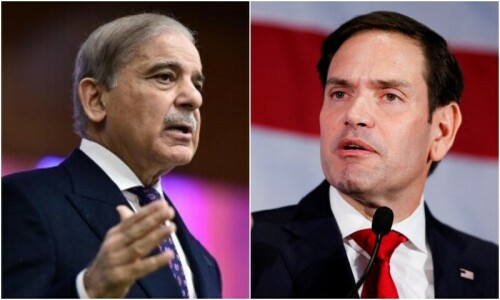US military sales to India go from zero to $15bn in decade
WASHINGTON: US military sales to India went from zero to $15 billion in the last 10 years and the United States hopes to get a major share in the $30 billion India plans to spend in military modernisation over the next seven years, says a senior American official.
At a recent hearing, Acting Assistant Secretary of State for South and Central Asian Affairs Alice Wells told a congressional panel that Washington sees India as a major defence and strategic partner and wants New Delhi to play a key role in bringing peace and stability to its region. She also underlined the US desire to sell nuclear components to India.
“The $10 billion in US export content in the potential nuclear deal, we believe would generate 15,000 jobs,” said Ms Well in a testimony before the South Asia panel of the House Foreign Affairs Committee.
“We obviously strongly support a prosperous India that plays a leading global role, both China and India are leading powers, but our relationship with India really stands on its own,” she said. “And it stands on its own because it’s based on democratic values, on close political and economic ties.”
“Look at the military relationship … we’re currently holding the largest military exercise with India and Japan … that brings together 10,000 personnel and our largest carriers,” she said. “With India as a major defence partner, we are able to now offer advanced technologies.”
Ms Wells recalled that during Indian Prime Minister Narendra Modi’s visit to the White House in June, US President Donald Trump made an ‘unprecedented offer’ of selling the Sea Guardian Unmanned Aircraft System (UAS) to India.
The Indian Navy has been seeking a long-endurance UAS for maritime surveillance for some years. The Sea Guardian provides a multimode maritime surface search radar and a unique identification system. The offer demonstrates a major change in US policy, as so far Washington has only provided this system to a select few of America’s closest defence partners.
“Now we want to build on that military partnership. India over the next seven years, is projected to spend $30 billion in military modernisation.
Our companies, like Boeing and Lockheed, with the F- 18s and the F-16s, are natural competitors. It would deeply enhance our interoperability with India,” Ms Wells said.
The US official also noted that 70 percent of the infrastructure, required to sustain and support the India of 2030, has yet to be built. This, she said, will be an enormous opportunity for US companies to benefit from this expansion as they already have the technology and expertise to help build the required infrastructure.
She pointed out that Boeing alone foresees a market for 2,000 commercial aircraft in South Asia over 20 years, and India will be the largest buyer. During Mr Modi’s visit, the US and India announced of a potential sale of planes worth $23 billion.
“Planes, commercial aircraft as well as military aircraft, are a key sector for exports in the future,” Ms Wells said.
The region’s growth has the potential to create a half a billion new customers for US businesses and consumer goods, financial services, technology, infrastructure, the health sector, energy, education, tourism and more.
In 2014, the United States exported more than $22 billion worth of goods to South Asia, making it the region’s number one trading partner.
Ms Wells explained that to further enhance its trade with South Asia, the United States wants to increase interregional connectivity as intraregional trade in South Asia comprises only 2 per cent of their total trade, which is the lowest in the world. Washington hopes that India would play a key role in promoting interregional trade as well.
“India is one of our most important strategic partners and a country of growing political and economic importance globally, with which our values and national interests increasingly align,” Ms Wells said.
Published in Dawn, September 12th, 2017











































